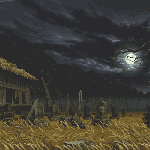|
ufarn posted:Contractions are supposed to reflect their counterparts, I suppose: doesn't = does not, etc. I'll let Brainworm answer whether or not it's "gauche" in writing, but linguistically this: quote:"Isn't it a bad idea?" = "Is not it a bad idea?" isn't true. Contracted word forms change the structure of the sentence, and you can't just break the pieces apart and expect the sentence to still work. You have to put the parts back in the right place if you're not going to use a contraction, effectively reversing the change in sentence structure. Otherwise the result is an ungrammatical sentence. The reading I get from using the contraction is that the sentence has negation raising over the subject to attach the negation as an affix to the copula (or "linking verb", in this case, is). So, without the contraction, the sentence should read like this: quote:"Isn't it a bad idea?" --> "Is it not a bad idea?" Which is the generally accepted reading. In other words, yes, it would be syntactically wrong to use the counterparts of contractions in the same word order, because the use of a contraction warrants a different word order to reflect (possible, see below) changes in the placement of negation. The "raising" idea shouldn't seem too far-fetched. For instance, the difference between the statement "It is not a bad idea," and the question "Is it not a bad idea?" is the raising of the verb to a higher place in the sentence, above the subject. Plus, if we make it a statement instead of a question, observe what happens: quote:"It is not a bad idea." = "It isn't a bad idea." There's no "problem" either way. I'm really giving this a simple treatment, though; FoiledAgain or another linguist goon could probably answer it in more detail if you're interested in the nitty-gritty of the syntactic aspect of your question.
|
|
|
|

|
| # ? May 13, 2024 21:48 |
|
Awesome, appreciate the answer and linguistic analysis - feel free to keep it coming. I thought as much, but couldn't put my finger on it based on the knowledge and terminology of linguistics and style. It's a little like knowing that you write "If I were you" without knowing the concept of subjunctive.
|
|
|
|
Brainworm posted:e.g. a few Pushcart winners. When is it proper to use e.g. and i.e.? Also, is it acceptable to end a sentence with a period and a question mark?
|
|
|
|
Vormav posted:Stuff. The only thing I'd add to this is emphasis; a contraction operates in day-to-day use as its own word. That operation may reflect the ordered use of the words it replaces, but there's no reason it has to. I won't dig in further since language should generally be left to linguists. I've said (written) this before, but I think it's worth writing again: writing well is a matter of ear, not a matter of grammar. A couple posts ago, I think I mentioned "discourse communities," or groups of people partly described by the ways they use language. Writing well means either instinctively or deliberately writing in the ways your audience is comfortable with, even if those aren't grammatically correct. Just for instance, I advise most people to never use the word "whom." There are of course times when "whom" is grammatically appropriate, but its use is rarely to your social advantage. Few discourse communities actively recognize the differences between "who" and "whom" and in them, as elsewhere, displays of "superior" learning are as tasteless as displays of superior wealth. So is it "gauche" to use contractions in writing? I don't think so. I've read manuals of style that suggest that contractions shouldn't be used in what they call "formal" writing, and I've heard students and some teachers parrot that rule. But me, I prize clarity and economy of expression above all other things; I split good writing from bad by whether every word tells. So faced with the choice of writing a simple sentence with a contraction or writing a more complex sentence without one, I'll take the simple sentence every time. I mean, it's not like a contraction is going to confuse someone or throw some busty poodle-walking dowager into hysterics.
|
|
|
|
TheChimney posted:When is it proper to use e.g. and i.e.? "E.g." is, by way of Latin, a sort of shorthand for "for example," while "i.e." (by the same Latinate process) shorthands "in other words." So using both: A well-reputed author (i.e. a Pushcart winner, e.g. Stephanie Watts) will likely be assaulted by John Updike. quote:Also, is it acceptable to end a sentence with a period and a question mark? As long as the period isn't there to terminate the sentence, I think so. But it's a situation better avoided, like dating a second cousin or taking your mom to a comedy club. If you've got a period terminating an abbreviation, and not a sentence, you could end the sentence with a question mark and so engineer a .?. E.g. "Have you seen Donovan Rubb, Ph.D.?" Or "have you ever had herpes, etc.?" However, both these sentences are awkward for reasons outside the punctuation. So I'd look at ".?" as a strange but harmless symptom of a potential phrasing problem.
|
|
|
|
Thank you for the answer. And the reminder that I need to get paid to write.
|
|
|
|
bengraven posted:Thank you for the answer. I know that last part is a joke, sort of, and it comes out of that "writer as a profession, not an identity" thinking. But I'd hate to think that, if you enjoy writing, you also feel pressured to get paid for it. What I meant with my answer is that when someone asks "what do you do?" they're usually asking an occupational question, and coming back with "I'm a writer but I work days bagging groceries" sounds a lot like "I'm an actor but I'm waiting tables." It's a sort of bait and switch. After all, someone who asks what you do isn't asking what you like to do or what you're good at. That said, the "I'm bagging groceries right now but I just finished my first novel" flavor of response sounds like a good way to split the difference, since it doesn't confuse your occupation with your skills and interests. Also, I think my response is informed by a bit of a pet peeve. I meet a lot of "writers," but when I ask what they've written I get a blank stare, like I've just posed a surprising and inappropriate question.
|
|
|
|
How would one go about getting a course of their own design. I know a professor at my school has one, and he could not have been here more than two years. I was wondering if you know anything about the development of English courses.
|
|
|
|
Coming from a theatre background and having published a couple of plays, I've learned to hate theatrical "writers" the worst. Actors are notoriously bad writers, and their plays are insipid and masturbatory. But they really love to classify themselves as writers because it sounds so deep and intriguing. I've had to sit through undergraduate student playwriting collections here, and it's gotten to the point where I want to start a drinking game where you take a drink every time: 1) An unnecessary curse word is used (double if it's the phrase "mind gently caress." 2) Drugs are used casually onstage. 3) A character drinks excessively or references drinking as "awesome." 4) The characters are "college kids" or they're "going to a frat party." 5) The lead character is a Mary Sue who gets the girl. 6) There is no discernible action, only a collection of Kevin Smith-esque pop culture discussions/references. I'd be dead by intermission. To get back to the point of this post, I'm studying for my second comprehensive exam - this one's over Greek theatre. I'm revisiting some introductory books, and I found a section that reminded me of that porn paragraph from Brainworm's publication that made it through several rounds of peer-editing. This comes from a chapter detailing lesser dramatic performances at Athens, specifically, puppet theatre: A Short Introduction to the Ancient Greek Theatre posted:Comedy would certainly have provided a model of physical knockabout, but like comedy the puppet theater might have drawn on a ready source of parody in tragic plots and performance. Perhaps the most obvious candidate for a puppet character, in our heavily restricted view, must be a folk hero such as Heracles, with his club, his appetites, and his bravado. Puppetry is also a theater of sounds, as well as actions and voices; it would be very surprising if farting was not involved. I love academia.
|
|
|
|
Electric Pez posted:How would one go about getting a course of their own design. I know a professor at my school has one, and he could not have been here more than two years. I was wondering if you know anything about the development of English courses. Judging by your thread, you mean as a professor, yes? First you: 1) Complete a BA in English lit or a field related to it 2) Apply to graduate programs in English lit or a related field, hope you get a funded spot 3) Spend 5-7 years (or more) completing coursework, TAing, studying for comprehensive exams, producing articles or conference papers, and finally writing a dissertation. 4) Seek a job. You will probably not get tenure track on the first go, so expect to hop around as an adjunct for a year or more. These days, even that's "if you're lucky." 5) Finally get a tenure track job, where you may or may not have control of which courses you teach initially, depending on the needs of the department. 6) If you are allowed to design your own course, you will have to do so within the guidelines of the university where you work, making sure to achieve certain learning goals. Brainworm can probably tell you more specifically about designing an English course, but that's the basic outline of what you'll have to do to even be in that position.
|
|
|
|
.
Lawful Judas fucked around with this message at 02:56 on Mar 6, 2012 |
|
|
|
elentar posted:I'm trying to decide between doctoral programs at the moment. Given: As it turns out school D came through at almost the last minute, and with a bump from assistantship to fellowship besides. Now I just have to make sure I don't burn bridges at the other two that have been recruiting me the whole way...
|
|
|
|
Electric Pez posted:How would one go about getting a course of their own design. I know a professor at my school has one, and he could not have been here more than two years. I was wondering if you know anything about the development of English courses. Assuming you've done the work Eggplant Wizard lays out -- college, graduate school, getting a job, and so on -- conventional English courses develop about like conventional courses in other disciplines. A good English course is going to have a set of learning goals defined by the goals of the college and the needs of its students. Colleges are different, after all; some have English majors and some don't. Some of those majors are writing focused (like Kenyon's), some are globally-focused (in which case you've got a Comparative Literature department rather than an English department proper), and so on. What I'm saying is, a college has a clear idea of what kind of graduate it wants to produce, and any course is a function of that institutional goal. Colleges likewise have different student populations. Just for instance, my college has a huge population of international students -- about one sixth of our students are international and speak English as a second language. So every course I design needs to use a pedagogy that's going to meet the needs peculiar to my students. In other words, course design is really a process of figuring out what role a course plays in students' development -- their movement from what they are when they matriculate to what they need to be when they graduate. I've laid all that out because getting "a course of your own design" has everything to do with demonstrating a clear understanding of a how a college intends to develop its students. Most of the time, a new course needs some kind of approval, either from its affiliated department, a dean or college committee, or both. Different colleges have different standards for approval, but those standards are generally driven by some vision of students' development. Of course they're also driven by other things -- budgets, calendars, and so on -- but my logic of course design is to meet student needs first, and then compromise whenever hard limits like money and scheduling are an issue. I'd like to think that this approach is typical.
|
|
|
|
How do you feel about the word oval office? And what are your feelings towards people who pepper their speech with such words?
|
|
|
|
bartlebee posted:Coming from a theatre background and having published a couple of plays, I've learned to hate theatrical "writers" the worst [...] and it's gotten to the point where I want to start a drinking game where you take a drink every time: Truer words were never written. I don't often teach Creative Writing, but I support the students who do it, run the occasional workshop, and go to lots of readings - mostly short stories rather than poetry. My lethal drinking game looks like this: If the reader is male
If the reader is female
Point is, at any collegiate reading, you'll hear about more about cigarettes, guns, blue-collar affectation, and post-molestation trauma than you would at a steering meeting for the Diocese of Brooklyn. And you'll hear it from otherwise good writers. It's like a phase everyone has to go through.
|
|
|
|
Lawful Judas posted:
Just wanted to chime in to say that this book is one of the best I've ever encountered. Brilliant characters, really helped me to appreciate and further understand News Orleans culture once I finally visited. His other novel, The Neon Bible, is also quite good (especially considering he was sixteen when he wrote it).
|
|
|
|
I'm a writer, and one thing that bothers me about it is the loose answers on certain things. I've asked several other English people about this and I get a different answer every single time: What's the rule on the simple series of commas? Is it "example 1, example 2, and example 3" or is it "example 1, example 2 and example 3"? Please clarify!
|
|
|
|
Lawful Judas posted:Have you heard the This American Life episode about the prison that staged Hamlet? If so, what do you think about it (especially the various prisoner interpretations)? If not, I think you'd really enjoy it. It's a great example of how universal and relevant Shakespeare is. I haven't heard the TAL episode -- I like TAL, but haven't gotten through a massive backlog of downloaded episodes -- but I know the program the show's about. Not to name drop, but last year I had Agnes Wilcox (the director of Prison Performing Arts) come to campus to talk about her work and visit with a couple of my classes. The interesting thing here is that the "universality" cliche with Shakespeare is almost exactly right. It's only when people overthink, or get intimidated by, Shakespeare that they don't get it. Of course it helps when you read with an eye to performance rather than classroom-style analysis, but the point still holds. I mean, I've given (an abridged) Julius Caesar to third and fourth graders before. They read it as being about a group of friends who turn on each other, which is about right. quote:Another one of these, but what do you think of A Confederacy of Dunces? I used to like it a great deal, and I think I still do. The thing about it for me is that I wish it stood up to repeated readings better than it does; part of what makes that book fantastic the first time through is your surprise at what I'll call the "selective competence" of Reilly's character. And like most farces, part of what drives the situational comedy is surprise and shock, like seeing the stains on the bedsheets Reilly brings to the factory protest. That's never as good the second time around. quote:Toole was an English professor who wrote this on the side and his mother published it for him after he died: have you written any fiction that proud Mama Brainworm will release after your premature death? I've written a bunch of short pieces -- stories and nonfiction -- for readings, but most of these I've never sent out for publication. There might be good reasons to do that later on, but right now I really, really, can't juggle everything I already do and keep my envelopes in the mail. Or, put differently, I can't put my agent in the position of having me ask for delays on one thing so I can finish another -- especially since I'm not a professional writer. quote:This is one of the best threads I've read. I'm glad you like it. It's had enough readers that I'm thinking through how to get it onto my CV.
|
|
|
|
This might be somewhat outside your sphere of interest, so don't be afraid to say something if it's not an appropriate question or one you feel comfortable answering. I'm writing a paper on the notion of Honesty in the works of Raymond Chandler, specifically focusing on Phillip Marlowe as opposed to the short stories. For the purposes of the paper, I'm using Honesty as a catch-all term for truth, rightousness, chivalry, and similar ideas, and examining how Marlowe strives not to be completely honest, but only "fairly honest" as a mechanism for survival in a world where you are surrounded by corruption and dishonesty at every turn. In my examination of secondary sources, I've seen a lot of analysis of Marlowe as a chivalrous knight. Pretty much all of this analysis starts and stops with "The Big Sleep", and everybody looks at Marlow's interaction with the statue of the knight rescuing the maiden at the gates of the Sternwood Estate. Basically they say something along the lines of "Here, Marlowe is playing the role of the knight, and he identifies with the statue of the knight in the garden." Then they throw in the quote about how Marlowe thinks he might need to go help the knight rescue the maiden, and call it good. One author goes a little bit further and examines General Sternwood's role as Marlowe's lord in the book, and comments briefly on how that colours Marlowe's interactions with the Sternwood daughters. He then ends the comparison with a note about how Canino is a knight for Eddie Mars, and Marlowe kills him in dishonorable combat. However, Chandler wrote a lot of books about Marlowe after The Big Sleep, and I don't feel like doing fifteen pages of analysis on one or two scenes of the first book in a series, especially when the character gets so richly developed in later books. Do you have any comments about Marlowe's role as a chivalrous knight in Chandler's later books? If you're not familiar with the character of Philip Marlowe, but you know a lot about general characterizations of Arthurian knights, would it be possible for us to exchange a couple emails so I can get some solid background and start doing my own analysis of this stuff? I'll pm you my email address if that's the case. I realize that the second option is a lot more likely, but I recognize that you're a busy guy and might not have time to be exchanging emails with an undergrad doing analysis on Detective Fiction; I just figured there was no harm in asking. Coca Koala fucked around with this message at 23:10 on Apr 15, 2010 |
|
|
|
Technowrite posted:What's the rule on the simple series of commas? Is it "example 1, example 2, and example 3" or is it "example 1, example 2 and example 3"? I think this one was covered earlier in the thread.
|
|
|
|
Hey guys, I'm crossposting, but I have kind of an ethical problem involving my sister. Here's the original post: http://forums.somethingawful.com/showthread.php?threadid=3198184&pagenumber=65#post375414936. Thanks for any help.
|
|
|
|
elentar posted:As it turns out school D came through at almost the last minute, and with a bump from assistantship to fellowship besides. Congrats, man. I don't think you'll need to worry about bridge burning as long as you explain your situation honestly. Everyone understands your taking a better offer. Also, nobody's going to remember you turning down a grad school offer in like six or seven years when you go on the market. What I'm saying is, nice job. And don't worry.
|
|
|
|
Coca Koala posted:Philip Marlowe and Chivalry I'm not the OP, but I took a class on this when I was an undergrad. It's been several years since I studied those books, but the professor that taught detective fiction was the same guy who taught Chaucer and medieval romance, so this subject came up a lot. A few small things come to mind. The basic structure for a medieval romance is 1) Something is not right in the knight's world. 2) The knight journey's out into unfamiliar territory to fix the problem. 3) The knight returns home to a world where everything is right again. The more complex ones either just repeat those three steps or step 2 is extended by having the knight go deeper and deeper into the unfamiliar. Detective novels in general follow this formula. In the medieval stories, the "unknown" would be a place of danger and strange magic, similar to the detective who is constantly hit over the head by hired thugs and drugged. The difference is that in detective novels, things aren't made "right" in the end as much as the detective is able to make sense of things after a long period of confusion. In Farewell My Lovely, there is a character named Laird Brunette who runs a casino boat. Laird = Lord, so it seems Chandler is trying to make a connection there with medieval lit. My professor drew some parallels between Marlowe's ride out to the casino boat and a journey into the underworld, but I don't remember the specifics. Also, the femme fatale in Chandler's works, and in all detective novels, is sort of a cynical, misogynistic re-working of the fair ladies in medieval romances. You often would have the knight going on his quest in the name of or at the command of Queen Guenevere, whereas in detective novels, women often control the detective through sexual manipulation. And actually, I don't remember her name, but Sir Gawain and the Green Night actually has a lady of the castle acting as femme fatale. There's also a fair amount of father-daughter incest behind the actions of the female characters in both medieval lit. and detective novels, though I don't know if that specifically relates to Chandler's books.
|
|
|
|
Malaleb posted:Chivalric summaries Awesome, thank you so much! That's exactly the sort of stuff I was looking for, something that I can use as a solid jumping off point for some of my own analysis. I appreciate it!
|
|
|
|
Coca Koala posted:Awesome, thank you so much! That's exactly the sort of stuff I was looking for, something that I can use as a solid jumping off point for some of my own analysis. If you have time and you need to read more about those romance conventions, check out The Secular Scripture by Northrop Frye. It expands on alot of the stuff in Malaleb's post about romantic conventions and themes of ascent/descent (into unfamiliar territory) and the eventual return to the social order (or not, as in the case of detective fiction).
|
|
|
|
PlasticPaddy posted:How do you feel about the word oval office? And what are your feelings towards people who pepper their speech with such words? I curse all the time, but not usually at people. The problem that I have with e.g. "oval office" is that it's not really shocking or particular and so doesn't have any power to hurt. For instance, say I call girlfriend a oval office. She might be, like, mildly hurt that I'm calling her names, but she's also going to write me off because the word "oval office" is a worn out verbal weapon. It's like throwing a ping-pong ball at someone. No matter how hard you do it, it doesn't have enough weight to do any damage. That's the problem, right? People think of profanity as general, but it's not. If it's going to work, it needs to be just as deliberately used as words like "verisimilitude" or "crepuscule," which are particularly effective in their own narrow environments and basically useless anywhere else. So saying "oval office" all the time, it's kind of like always saying "ephemeral." It probably means that you don't know how to use it well.
|
|
|
|
DirtyRobot posted:If you have time and you need to read more about those romance conventions, check out The Secular Scripture by Northrop Frye. It expands on alot of the stuff in Malaleb's post about romantic conventions and themes of ascent/descent (into unfamiliar territory) and the eventual return to the social order (or not, as in the case of detective fiction). My library has it, I'll check it out today. If anybody else has recommendations for resources that you think I should be looking at, definitely let me know. I appreciate all the help very much!
|
|
|
|
Brainworm posted:
* Drink if the story is about a marriage slowly falling apart * Drink 2 if the marriage is falling apart because of a dead baby * Drink if the major conflict of the story can be summed up as #firstworldproblems (bonus if said problems are making the main character act inexplicably "crazy" in an unwitting attempt to combat middle class malaise)
|
|
|
|
Coca Koala posted:My library has it, I'll check it out today. If anybody else has recommendations for resources that you think I should be looking at, definitely let me know. I appreciate all the help very much! Keep in mind I don't know a lot about Chandler, so I'm recommending these mostly based on your post. Sir Walter Scott has both an "Essay on Romance" and an "Essay on Chivalry" that go together. They are both very good, but I'm not sure if they're used for anything other than historically contextualizing 19th century texts (which I think is unfair to Scott). You could check out Frye's Anatomy of Criticism. It's a lot longer than The Secular Scripture, but the section called "The Mythos of Summer: Romance" in the Theory of Myths essay contains some relevant stuff. I think your best bet is an essay by John Ganim in Medievalism and the Modernist Temper called "The Myth of Medieval Romance" that traces views of romance from the 18th century up to the present.
|
|
|
|
Brainworm posted:Point is, at any collegiate reading, you'll hear about more about cigarettes, guns, blue-collar affectation That strikes me as odd. What is it about blue-collar people college kids find so interesting? I'm blue-collar and I can't see anything worth writing about.
|
|
|
|
PlasticPaddy posted:That strikes me as odd. What is it about blue-collar people college kids find so interesting? I'm blue-collar and I can't see anything worth writing about. It's probably like the movie Barton Fink. They are in love with their own romantic notions about working class people, because it makes them feel like they are somehow connected to the "real" world without actually having to be a part of it. "I'll show you the life of the mind!"
|
|
|
|
Brainworm posted:Truer words were never written. I'm interested in the dominant style of such an emo shitfest. Garden variety realism? Poorly wielded stream of consciousness?
|
|
|
|
It's usually just really boring, like bad Raymond Carver.
|
|
|
|
To anyone in this thread who has ever taught a college course: What does it take to be a badass as an undergrad lit student? How do you generally go about grading essays? In comparison with the work of other students? In comparison to the student's previous work? Is there a grading bell-curve you shoot for in assignments or in the class as a whole? I don't want to sound like some obnoxious gunner (which is why I'm posing the question here instead of to an actual professor), but the academic world is so competitive I can't help but feel that learning what professors want to see is really important. The approach English professors have to grading is just so mysterious to me.
|
|
|
|
What do you think of Bennington College?
|
|
|
|
Brainworm posted:I curse all the time, but not usually at people. The problem that I have with e.g. "oval office" is that it's not really shocking or particular and so doesn't have any power to hurt. I always thought oval office was the last truly offensive word left. I guess I am behind the times.
|
|
|
|
Yeah, I kind of thought so too. At least in the US.
|
|
|
|
Malaleb posted:The basic structure for a medieval romance is 1) Something is not right in the knight's world. 2) The knight journey's out into unfamiliar territory to fix the problem. 3) The knight returns home to a world where everything is right again. The more complex ones either just repeat those three steps or step 2 is extended by having the knight go deeper and deeper into the unfamiliar. Detective novels in general follow this formula. In the medieval stories, the "unknown" would be a place of danger and strange magic, similar to the detective who is constantly hit over the head by hired thugs and drugged. The difference is that in detective novels, things aren't made "right" in the end as much as the detective is able to make sense of things after a long period of confusion. I can get on board with this. I don't know much detective fiction, but I'm all over Medieval Romance. So I can add a few things: First, knights exist in what I'ma call an ineffectual context. You can see this most in Chretien de Troyes's Arthurian romances, but I think it's true across the genre. In Troyes, like in, say, "Gawain and the Green Knight," a knight is driven to his quest largely because everyone else -- including the king -- is either too scared or too lazy to take it on. That's seriously counterintuitive but totally true. If you look at Chretein, all King Arthur ever does is take naps and give people haircuts. I'm not sure how this translates into the detective novel, except that the detective, like the knight, is driven to action partly because there's a sort of vacuum of authority. Second, there's a lot of bargaining in Romances. Usually, your questing knight is going to encounter a helper to whom he has to keep his word or with whom he must act out act out some kind of deal. In the umpteen variations on the "loathly lady" story, this is a hag the knight has to promise to marry in exchange for the answer to a riddle. In "Gawain" it's the creeper Green Knight and his equally-as-creeper wife. As I remember it, The GK strikes this deal with Gawain that anything the wife gives Gawain, Gawain has to give the GK. Turns out, this is kisses. And there's a second, slightly more important, bargain where Gawain and the GK agree to a chop-off-each-other's-head contest. I'd be interested in seeing how and whether this kind of bargaining shows up in detective fiction. It seems like it'd translate well. EDIT: And yeah, Frye's Secular Scripture is the book you want. Brainworm fucked around with this message at 13:34 on Apr 20, 2010 |
|
|
|
Malaleb posted:It's probably like the movie Barton Fink. They are in love with their own romantic notions about working class people, because it makes them feel like they are somehow connected to the "real" world without actually having to be a part of it. There's something to that. I think there's a certain kind of twenty-year-old who confuses middle-American values and integrity. It's like some part of them secretly believes that Country/Western song trope that dirt roads, high-school football, and working with your hands are part of some quintessential and deeply valuable experience of American masculinity. It's that idea, incidentally, that has for some time made me want to write the story to end all blue-collar stories, that ends with a completely idiotic monologue that articulates cryptic value after cryptic value -- sort of what you see at the end of The Rise of Silas Lapham, since Howells had the same idea more than a century before I did. Anyway. So the story would feature a suburban college kid working with some townie who does a townie job -- say, driving a snowplow. And the story would be the story of the kid not appreciating how important snowplow driving is, how it'd save everyone a lot of money if snowplows could be like, self-driving Roombas of the road. And it'd end with the townie lecturing him, right? Like: sage townie posted:You don't know what a man is, do ya? What a man does? A man may not come from much, some trailer at the end of some no-account dirt road. But a man makes something of himself. He works. He don't need fancy math or fancy words, because a man, he works with his hands. That's real work. That's honest. He drives a plow, because that's the kinda thing a man needs to do. Use his hands. On a machine that does, you know, all the actual work for him.
|
|
|
|

|
| # ? May 13, 2024 21:48 |
|
Business posted:What does it take to be a badass as an undergrad lit student? Really, literary study at any level is only about two things. It's about close, careful, and constant reading, and about spotting similarities and differences between texts. Just for instance, all the talk I do about literary tradition is really just about continuity and change. You can give that continuity and change whatever name or apparatus you want, like "influence" or "base/superstructure Marxism" or "the gradual inclusion of heretofore oppressed literary voices in the canon of English Literature." But it amounts to the same thing: you need to discover how texts change over time before you can develop any intelligent theory about which of these changes matter and why they happen. Just for instance, say I ask you to do an epic-scale reading of significant characters in several canonical pieces of Early English literature: Barabas in Marlowe's Jew of Malta, Iago in Othello, Satan in Paradise Lost, and the Monster in Frankenstein. That's a loaded prompt, since I think these characters represent the evolution of a villain type that goes back to the Vice character in Medieval Mystery plays. But I think that, no matter what kind of apparatus you want to use to read these characters -- whether you think they reflect, say, the increasing cultural significance of Britain's imperial project in its literature -- you need to be able to talk in really particular terms about how these characters are similar and different. Without that, you can't make a convincing case for anything. quote:How do you generally go about grading essays? In comparison with the work of other students? In comparison to the student's previous work? Is there a grading bell-curve you shoot for in assignments or in the class as a whole? The short answer is yes. Grades are really terrible at showing you how one student's achievement stacks up against another's. They can give you a rough idea as an aggregate like e.g. GPA, but even that's lousy. I mean, a 4.0 at Reed is totally different from a 4.0 at Kenyon, and that's comparing two schools that are similar in most fundamental respects. So most of the time, and like members of most other disciplines, I grade on a sort of de facto curve. A curve is really just another way of norming grades, and you can do that norming while you're e.g. writing an exam or while you're grading it. It doesn't make a lick of difference one way or another. But my job first job is teaching students, and that trumps evaluating them in anything like a consistent way. That's not true for every professor at every college, but it's absolutely true here. So I'll use grades as a student motivator, grade against past work, contract grade, and even grade against what I believe a student is capable of based on conversations with their professors and advisers. In practice, this means grading able students harder; grading lax students easier never works out well.
|
|
|




















